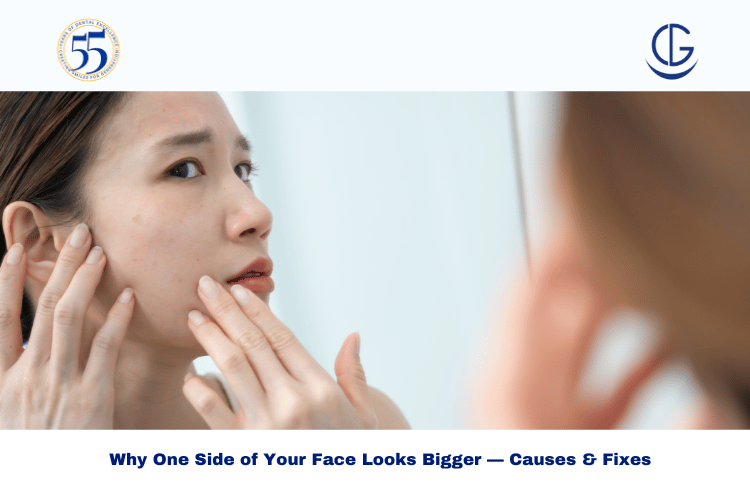Schedule Appointment


It can be surprising—and sometimes worrying—to suddenly notice that one side of my face looks bigger in the mirror, photos, or during video calls. While minor facial asymmetry is normal for every human, a visibly bigger, fuller, or swollen side is something you shouldn’t ignore. Many people assume it’s just aging or weight gain, but facial asymmetry often has deeper reasons related to muscles, jaw alignment, dental issues, or everyday habits.
This detailed guide explains why it happens, how to know if it’s normal, and when you should seek a professional evaluation at Dr Gowds Dental Hospital.
Yes — mild asymmetry is natural. Every face has slight variations, and no two sides are identical. This natural difference is often subtle and not noticeable in daily life.
However, when the asymmetry becomes more obvious, persistent, or appears suddenly, many people begin to wonder why one side of my face looks bigger than the other. In such cases, it may indicate:
Although not always dangerous, noticeable asymmetry is usually treatable once the underlying cause is identified.
Let’s explore the most common reasons people say “one side of my face looks bigger” and what each one means for your health.
1. Muscle Overuse or Underuse (Functional Asymmetry)
If you chew predominantly on one side or clench your jaw on one side during stress or screen work, the masseter muscle can enlarge over time.
Signs:
This is one of the top causes of facial asymmetry in working professionals.
2. Sleeping on One Side Every Night
Constant pressure on one side of the face can flatten or push the tissues slightly inward, making the opposite side appear bigger.
Signs:
This habit-related cause is easy to miss but common.
3. Dental or Bite Problems (Malocclusion)
If your teeth don’t align properly, the jaw shifts to one side, causing the muscles and bones to compensate over time. Many patients report one side of my face looks bigger after years of untreated bite imbalance.
Signs:
Dental-related asymmetry is one of the most treatable causes.
4. TMJ Issues (Jaw Joint Problems)
When the temporomandibular joint is inflamed or misaligned, one side of the face can swell, stiffen, or appear fuller.
Signs:
TMJ-related facial asymmetry can gradually worsen if untreated.
5. Sinus or Soft Tissue Swelling
Sometimes facial asymmetry is temporary and linked to inflammation.
Possible triggers:
This makes the cheek, eye area, or jaw appear swollen on one side.
6. Natural Bone Structure Differences
Some individuals naturally develop one cheekbone, jaw angle, or orbital bone slightly differently than the other. This structural asymmetry usually becomes more noticeable with age or weight changes.
Signs:
This is normal but may still be improved cosmetically.
7. Aging-Related Facial Changes
As we age, volume loss doesn’t occur equally on both sides. One side may lose fat faster, causing the other side to look fuller in comparison.
Signs:
This imbalance can be improved with targeted treatments.
Yes — in most cases, facial asymmetry is treatable or significantly improvable. The key is identifying what is causing the imbalance.
People usually seek help when phrases like:
become a daily concern. While home remedies rarely solve the root issue, a clinical assessment can quickly guide you to the correct solution.
Book a consultation if you experience:
The earlier you identify the cause, the easier it is to treat.
Many cases of facial asymmetry originate from:
These issues require more than a skin-level analysis — they need oral, facial, and structural evaluation, which dental-facial specialists are trained to perform.
Facial asymmetry isn’t just a cosmetic issue. It often reflects underlying factors the body has been compensating for over months or years. And the good news? Most cases are correctable with the right guidance.
Whether your concern is muscle imbalance, bite issues, jaw tension, or swelling, an expert evaluation makes all the difference.
If you’ve been noticing that one side of my face looks bigger, now is the right time to get clarity. Early assessment helps prevent worsening and gives you a personalized plan for correction.
Schedule your facial symmetry evaluation at our clinic today.
Your face deserves expert attention — and achieving balance starts with one consultation.
People often experience facial asymmetry due to muscle imbalance, chewing habits, sleeping on one side, dental misalignment, swelling, or natural bone differences. Most cases are treatable once the underlying cause is identified.
Yes, minor facial asymmetry is normal. But if the difference is sudden, increasing, or noticeable in photos, it’s best to get evaluated to rule out dental, jaw, or muscle-related issues.
Absolutely. Bite imbalance, missing teeth, or jaw joint (TMJ) problems can make muscles overdevelop on one side, leading to visible asymmetry. Dental evaluation is often essential in these cases.
Yes. Constant pressure on one side during sleep can flatten the tissues over time, making the opposite side appear bigger. This is a common lifestyle-related cause of facial asymmetry.
Correction depends on the cause — improving posture, changing chewing habits, treating dental issues, addressing muscle imbalance, or managing swelling. A clinical facial symmetry assessment helps identify the right plan.